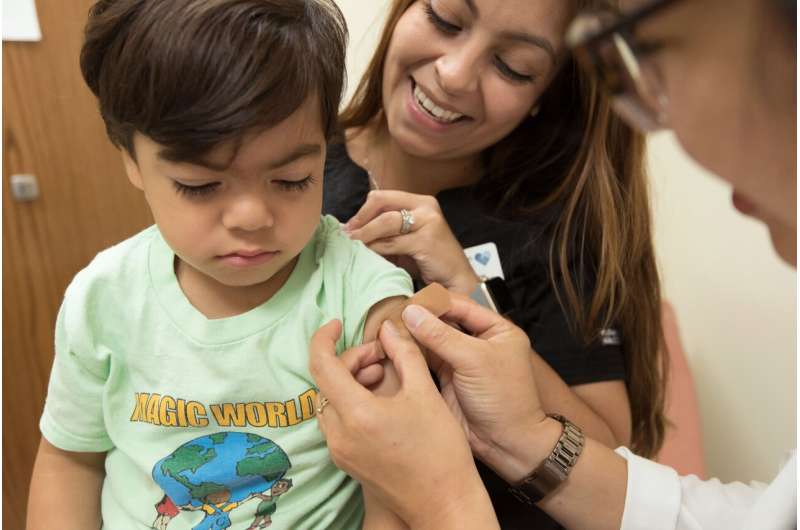COVID vaccine trial for kids on track


UMass Medical School’s principal site investigator for Moderna’s TeenCOVE and KidCOVE mRNA COVID-19 vaccine clinical trials said that trial sites are on track to expand the number of children in the Moderna KidCOVE trial, as requested this week by the Food and Drug Administration.
Inclusion of more children in the vaccine clinical trials is important to be able to evaluate potential rare side effects. Meanwhile, use of currently available tools will be necessary to meet the call by pediatricians, parents and health leaders to bring children back to school safely in fall.
“Fortunately, we’ve seen a large number of families stepping forward to participate, so we do not anticipate any difficulty in enrolling the larger numbers of children,” said Katherine Luzuriaga, MD, the UMass Memorial Health Chair in Biomedical Research; professor of molecular medicine, pediatrics and medicine; director of the UMass Center for Clinical and Translational Science; and vice provost for clinical and translational research.
Dr. Luzuriaga said the goal of the trial is to obtain the safety and immunogenicity data necessary to support Moderna’s filing for emergency use authorization of the vaccine for children ages six months through 11 years old, currently anticipated in late 2021.
Moderna filed for emergency use authorization for teenagers ages 12 to 17 in June, based on data from the TeenCOVE clinical trial, and the FDA and Centers for Disease Control and Prevention are expected to act on that request soon.
The FDA’s request to expand the number of young children in the mRNA clinical trial comes after a small number of cases of myocarditis, or inflammation of the heart muscle, were reported among the millions of adolescents and young adults who have received Pfizer or Moderna mRNA vaccines to date. Overall numbers were slightly higher than background rates in the general population; more cases were reported among young men than young women.
Still, “In a recent meeting convened by the CDC, careful analyses of available data demonstrated that the benefits of vaccination appear to greatly outweigh the risks,” Luzuriaga said.
According to analyses presented at the CDC meeting, for every 1 million fully vaccinated (two doses) boys ages 12 to 17, vaccination prevents 5,700 COVID-19 cases; 215 hospitalizations; 71 ICU admissions; and two deaths. At the rate that cases of myocarditis have been reported in vaccine recipients, a predicted 56 to 69 cases of myocarditis would occur.
For every million fully vaccinated girls ages 12 to 17, inoculation prevents 8,500 COVID-19 cases; 183 hospitalizations; 38 ICU admissions; one death; and carries a predicted eight to 10 cases of myocarditis.
With the emergence of the highly transmissible SARS-CoV-2 Delta variant as the dominant strain in the United States, Luzuriaga supports the recent CDC and American Academy of Pediatrics’ recommendations that everyone in kindergarten through high school wear a mask in school, whether vaccinated or not, to reduce new infections.
“This is an evolving situation because we have not yet achieved sufficient control of the virus,” Luzuriaga said. “You’ve got a virus that has been given ample opportunity to replicate to high levels in a number of individuals, which has facilitated the generation and selection of variants with enhanced capacity to spread. Greater vaccination coverage is important to reduce viral spread and the emergence of variants.”
Overall, she said, the reported number of breakthrough infections among fully vaccinated individuals has been small, and fully vaccinated individuals are less likely to have severe disease. The CDC reported as of last week, 5,914 hospitalizations or fatal breakthrough infections had been reported nationwide, among more than 161 million people who were fully vaccinated, or a rate of .004 percent. However, the CDC has also reported that rare, vaccinated individuals with Delta variant infection may harbor sufficient titers of virus to potentially be contagious to others.
While some have minimized the degree of illness children who get COVID-19 experience, Luzuriaga said that over 4 million children have tested positive for COVID, 14 percent of all cases to date, and 18,000 children have been hospitalized. In addition, as of early June, the CDC reported more than 4,000 cases of multisystem inflammatory syndrome in children, or MIS-C. Long-term effects of COVID-19 infection have also been reported in children and are currently under investigation.
“Getting kids back into schools full time in the fall and protected as much as possible from getting infected, is really important,” said Luzuriaga. “We focus on the medical issues, certainly the risk of disease itself, MIS-C and long-term effects of COVID. However, what’s become apparent is that children have really suffered socially, emotionally and academically from not being able to go to school.”
Source: Read Full Article




